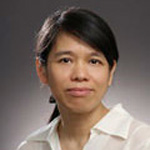Research areas that Dr. Chen focuses on are theoretical and computational mechanics, multiscale mechanics of biological materials, and the tailoring and design of nano/micro-materials through computer simulations.
Current projects being performed by Dr. Chen and her students include:
- Reformulation of Continuum Mechanics for Concurrent Atomistic-Continuum Modeling and Simulation: Analytically linking atomic variables to continuous local density functions through the development of a new formalism. It is anticipated that this research will lead to formulation of a field theory of mechanics that is equivalent to a fully atomistic model at fine scale and can be reduced to classical continuum mechanics at the macroscopic scale.
- Multiscale Mechanical Design of Hierarchical Cellular Materials: Understanding the effect of the hierarchical structure of wood’s extraordinary mechanical properties offers an opportunity to leapfrog current cellular materials technology. The objective of this project is to use computational and experimental analyses to create a fundamental understanding of how the multiscale structural organization of wood determines it’s mechanical properties and to discover design principles that may apply generally to multiscale hierarchical design of synthetic cellular materials.
- Reproduction of the mechanical properties of biominerals through multiscale simulation: This project aims to understand the exceptional mechanical properties of biominerals through molecular and multiscale simulations. Nacre is chosen to be reproduced in simulation because:
- It is the most-studied biomineral by experimental researchers in many fields and yet limited success in its biomimetic products has been achieved.
- Many of the macromolecules in other biominerals are unknown or have not been sequenced, but they are relatively well investigated in nacre.
- The rich pool of information about its architecture and composition has set the stage for computational research to provide additional insights and to obtain missing information, usually fine scale information or multiscale interaction, that cannot be accessed by present experimental techniques.

